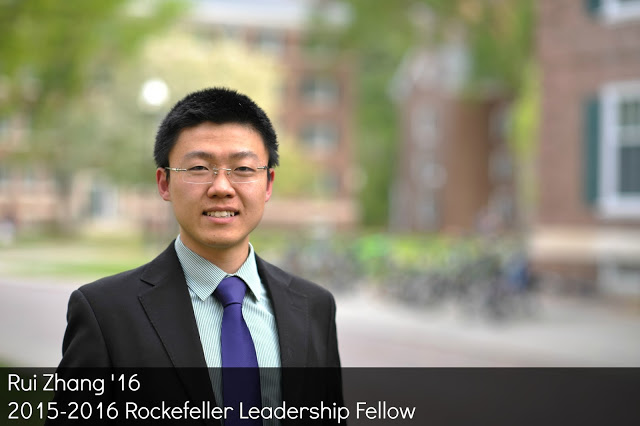- Public Policy
- Leadership
- Funding
- News & Events
- About the Center
Back to Top Nav
Back to Top Nav
Back to Top Nav
Back to Top Nav
This series introduces the 2015-2016 Rockefeller Leadership Fellows. Each fellow reflects on why he or she wanted to be a part of the program and what aspects of leadership most interests them.

I am interested in RLF because it brings together a group of seniors over three consecutive terms for a common purpose. No other program offers such a tremendous opportunity for seniors to bond and to learn from each others. I believe the best educational resource we have at Dartmouth is the people, so I want to learn from other Fellows and from the speakers. I am interested in learning what effective leadership looks like in an increasingly “flat” world. Organizations across industries/disciplines are becoming increasingly non-hierarchical in their structure. This shift of organizational consciousness opens up the understanding of leadership from title-based leadership to skill-based and role-based leadership.
I want to become a physician. I made the decision to pursue medicine in sophomore winter after exploring my personal characters through activities and getting to know the field of medicine through shadowing physicians. Medicine has long been the stage for “lone heroes,” especially in the context of surgery where surgeons are generally considered to be the most important persons in an operation room. However, we have entered an age where health care systems have become extremely complex and thus no one person can be credited or blamed for the performance of care. Physician-writer Atul Gawande puts it best - “the volume and complexity of what we know has exceeded our individual ability to deliver its benefits correctly, safely, or reliably. Knowledge has both saved us and burdened us.” An effective leader in today’s medical system knows when to speak and when to listen, allocates resources strategically and ethically, and above all, understands the strengths as well as the weaknesses of the health care system.
I co-founded Journey Inward-Journey Outward (JI-JO), a program through the Tucker Foundation that encourages deep listening, personal reflection, and creative group engagement. The purpose of the program is to enable Dartmouth students develop deeper understanding of themselves and of others. I directed the program along with Andrew Nalani ’16 and Rev. Nancy Vogele, Director of Religious and Spiritual Life. Leading JI-JO has been one of the best experiences I have had at Dartmouth because I was not only leading the group but also being led. We would use the first two sessions to establish the tone and structure of the program, and then would let participants (in groups of two or three) lead sessions on topics or their own choice; in this way participants were learning by teaching. In adopting this reversed leadership model, we were attempting to challenge the traditional understanding of leaders as the deciders; we viewed leaders more as facilitators who made sure effective structure was set up and maintained so that everyone could contribute to and benefit from the program.
I hope to help construct an atmosphere where Fellows converse and engage with each other in a civic, reflective, and meaningful way. I would like to incorporate the lessons I have learned through leading Journey Inward-Journey Outward into creating a trusting environment. I hope to learn from the stories of other Fellows and the speakers. I want to be introduced to the theories on leadership and also take away tangible exercises to enhance leadership capabilities. Ultimately, I want to better understand and fine-tune my leadership style.
Rui Zhang ’16 graduated from Lester B. Pearson United World College of the Pacific, an international high school with students from nearly 100 countries in the world. At high school, Zhang led student activity Current Affairs, served as a university counselor assistant, and was a core member of his high school’s Gumboot Dance Group. At Dartmouth, Zhang majors in Biomedical Engineering and has conducted research at both the Physics Department and Thayer School of Engineering. He leads a healthcare-themed Living Learning Community, serves as a Pre-Health Mentor, and works as a student assistant at Kresge Physical Sciences Library. Zhang plans to attend medical school after graduation.